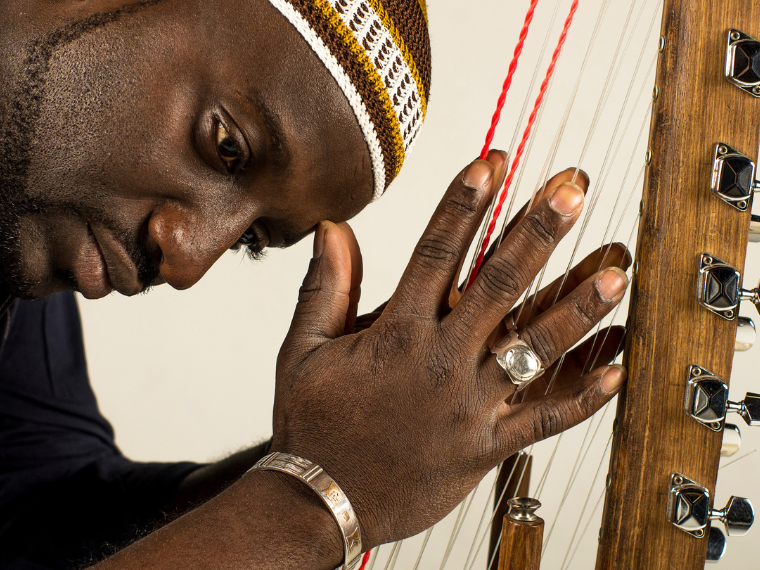by Stephanie Manning
Reposted with the permission of Oberlin Conservatory

Creating African Rhapsodies — which he released in 2023 with the BBC Concert Orchestra — was an “amazing” endeavor, he says. But his entry into the world of opera later that year was another thing entirely.
“When you have classical music meeting the kora, it’s amazing. But then when you have opera on top of that, it’s something else,” says the UK-based Senegalese musician. “That made me really excited.”
The opera he’s referring to is Omar’s Journey, a shortened version of Rhiannon Giddens’ Omar scored for voices and chamber ensemble. Keita was among the small group of musicians who performed Omar’s Journey at the Ojai Music Festival last year. “It kind of confirmed to me that voice is one of the really pure instruments in life. All those other instruments in the world have been made by humankind — but this, people are born with it,” Keita says.
Keita is no stranger to using his voice either, singing to accompany his playing in much of his solo material. And Oberlin audiences have a chance to experience his music making on December 7 at 7:30 pm, when he performs in Finney Chapel as part of the Artist Recital Series.
Selections from his albums 22 Strings and Homeland – Chapter 1 will make up most of his program. The goal is to create an opportunity “where the range of the kora could be here in the whole set — a variety of techniques and possibilities,” he says.
He also wants his concerts to be wider in scope than a typical recital. “When I say solo kora, imagine a harp solo, but beyond — the techniques are different, rhythms are different, there’s grooves, there’s melodies, there’s singing.”
Getting the audience involved is also important to him. “For me, there’s no difference between the performer and the listener when it comes to the show. We are in one room and we share.”
Keita will have an opportunity to share more details about his life and music during a lecture-demonstration about West African music on December 5. The presentation, part of the Omar events at Oberlin, also features faculty members Weedie Braimah, Talise Campbell, and Thomas Presto. “There’ll be more time for explaining the instrument itself,” he says. “I’ll be introducing the kora, but also talking about the story behind it.”
He’ll also discuss the griot, a hereditary storyteller-musician profession in West Africa. Keita was raised in the griot tradition — first learning to make his own instrument, then studying the kora repertoire, and finally venturing out into the world to spread his music-making.
“There is a difference, my granddad always said, between buying an instrument in the shop and making your own,” he says. “The one that you make, you know it inside out. So that’s why when you build your own instrument, it’s almost like a partner — you work as a pair together.”

During his visit, Keita also looks forward to seeing Oberlin’s concert production of Omar. “Fitting in was a joy, personally,” he says of playing in Omar’s Journey last year. Some of his colleagues from that performance — soprano Rhiannon Giddens ’00, tenor Limmie Pulliam ’98, and baritone Michael Preacely ’99 — will reprise their roles in Oberlin. “So it would be good to see it.”
For audiences who have never heard the solo kora, Keita says the listeners’ connection comes from both “the spirituality of it, but also, importantly, the joy. The idea is when I leave the room, these people will walk away with an aspect of happiness, and maybe have melodies ringing in their head.”
Keita adds that he’s often touched when hearing audience feedback and appreciation for the time that performer and listener spend together. “It’s really a heartfelt, warm thing that always happens to me and to the public as well.”
Published on ClevelandClassical.com November 26, 2024.
Click here for a printable copy of this article



